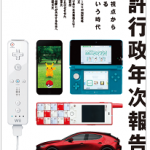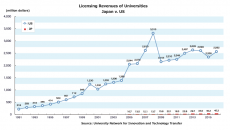
Finally, Japan’s courts are going to use information technologies for proceedings. Despite widespread use of IT in daily life, we have been required to conduct paper-based procedures and go to court for a brief preparatory proceeding. It would be welcome to improve this situation, but it’s too slow. The reported rough schedule is as follows. Arrangement of Issues using web conferencing in some courts: Around February 2020 Submission of briefs using cloud services in some courts : Fiscal 2021 Online oral argument: Fiscal 2022 (after revision of Civil Procedure Law) Online filing of lawsuit: Not yet scheduled It has been pointed out that Japan is behind Singapore, China, South Korea […]

Japan’s Tokyo and Osaka district courts will start an intellectual property mediation service in October 2019. The Tokyo district court published the operational guidelines for the new service on August 1. The purpose of this service is to solve an IP dispute quickly through a discussion between both parties, by advice or opinion from a mediation committee which consists of three members – a judge in the IP division and two experts such IP attorneys. This mediation tries to draw a conclusion in 3 to 6 months (within three times mediation meetings). The mediation committee discloses impression of the case. But also it may suggest the parties to solve the dispute […]

Japan Patent Office (JPO) published an annual report on July 12 2019. According to the report, 313,567 patent applications were filed in Japan in 2018. And, 253,000 patent applications among them were filed by domestic applicants. It slightly decreased than last year. As you may know, Japanese companies have been reducing investment in Japanese patents. However, my more serious concern is that they have been not increasing investment in patenting in foreign countries either, while increasing foreign sales. The chart shows the transition of foreign patent filing number and the foreign sales of Japanese companies. In fact, Japanese companies have not increased investment in intellectual properties, despite the increasing importance of […]

JPO’s SEP advisory opinion service has been updated for cases received on or after July 1 2019. This service started from April 2018, to provide a JPO’s non-binding opinion on whether a particular patent is a standard essential patent (SEP). We covered this service in the previous article here. The changes in the user’s guide include the following. User can demand an opinion that a particular patent is NOT a standard essential patent. User can use this service not only for licensing negotiations, but also for the negotiations in patent trade, business transfer involving patent transfer, and creation of security interest in patents. It explicitly describes that, even when JPO provides a […]

Japanese large companies have been stealing SMEs’ intellectual property. This issue was brought up in a working group discussing the improvement of business conditions for SMEs or subcontracting companies, as reported in our previous article. Then, Japan Fair Trade Commission (JFTC) conducted surveys on the handling intellectual property in the transactions in manufacturing industry, and published the report on June 14 2019. JFTC had responses from 15,875 manufacturers, and received reports of 726 incidents. The reported incidents include: Forcing the disclosure of know-how, to manufacture in-house or make other cheaper companies manufacture the product using such know-how. Doing joint research only by name, in which only a subcontracting company works […]

On June 7 2019, Japan Intellectual Property High Court ruled standard for calculating damages, especially deductible expenses, in a patent infringement case on carbonated pack cosmetics. Below is the summary of the decision. 1. Presumed damages Japanese patent law provides provisions to make it easier for patent holders to prove the amount of damages. One is to regard “the amount of profit earned by the infringer” as the amount of damages of the patent holder (Article 102, paragraph 2). Profit earned by the infringer Here, the court ruled that “the amount of profit earned by the infringer” is the marginal profit which is calculated by deducting “the expense which is […]

Previously on this blog, we featured a story about a fight on patent royalty between a university researcher and a licensee company. And, it suggested a problem of a talent shortage for intellectual property in the university. Licensing Revenues of Japanese Universities When talking about licensing revenues of universities, Japanese universities are often compared with American universities. Then, Japanese universities’ low income is considered a problem. In fact, American universities earned USD 2,562 million in 2016, according to University Network for Innovation and Technology Transfer (UNITT). On the other hand, Japanese universities earned JPY 4.53 billion (about USD 41.2 million). There is a big gap between them. However, it is not simply […]

In response to the global trends, the Japanese government announced a policy to strengthen the personal data protection on April 25 2019. It will enhance the right for individuals to demand companies to stop using their personal information. Under the current law, individuals can demand it, only if such data has been fraudulently acquired or used for purposes other than the original intent. On the other hand, the government has considered the creation of the so-called data bank, as introduced before. The data bank distributes personal data with the consent of the individuals. Then, it provides them with the compensation. I hear that, in the demonstration experiment, most users have chosen to […]

Recently, I found a misleading website which provides registration service for intellectual property. It provides a global registry for patents, designs and trademarks on the blockchain network. It says you can register an intellectual property in minutes at a cost of less than $15. This website should add more explanation. The registration on the blockchain certainly helps you prove the existence of a particular document at some point in time. However, it doesn’t create rights of patent, design or trademark, even if such a document describes a new idea, design or trade name. You need to file an application to the patent office and get through an examination to obtain […]

Do you think Japanese patents are difficult to use? I visited Chinese IT companies early this month. A person in charge of licensing said Japanese patents are difficult to use, as well as Korean patents. Because the specification, claims and other documents for Japanese patents are written in Japanese language, he is not sure if he understands the patent correctly. Another person from a different company explained how they handle the inventions created in their Japan office. They prepare patent documents in English to file a PCT application. So, they can review the English documents directly, not the translations. This would be not special to this company. For companies which prioritize […]





